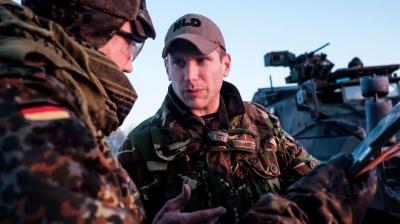News
What will it take to have a European army?
In the run-up to the European Parliament elections, Clingendael experts answer questions from our online audience. In this second episode, Amy Verdun asks: What will it take to have a European army? Dick Zandee answers her.
Dick, before you get to the answer, you’d like to make clear that the term European 'army' is actually incorrect. Why is that?
An army means forces on the ground, but of course there are also the domains of sea and air. So a better term would be European armed forces.
What is your definition of European armed forces?
That's a very good question, because multiple definitions circulate. If you ask me, I’d say it would be simular to the US armed forces. That means everyone speaks the same language, there is one political leadership, in case of the US the White House, there is one commander-in-chief and one command structure. In Europe all these things lack.
Text continues below video.
The debate about European armed forces is not new, but it is louder than before. What arguments do proponents put forward for its necessity?
Often mentioned is the growing uncertainty about US support for Europe. Think of the years when Donald Trump was US president. He may now become president again. The argument is that Europe must therefore be able to stand on its own two feet. The threat posed by the Russian war in Ukraine gave a huge push to pursue that goal. But for many proponents, idealism also plays a part. In their view, the European Union should be a power factor in the world and that includes having its own armed forces.
You indicate that European armed forces as you just described is unrealistic. Why?
For many reasons. First, I would mention political will. We don't have a single-headed political leadership in Europe. Nor do we have a single commander-in-chief of the armed forces. All is regulated nationally. There are also practical obstacles, such as language problems. A Finn does not speak Portuguese, a Norwegian does not speak Greek. At headquarters, everyone might speak English, in the field they do not. The equipment of all member states is also very diverse and often not interchangeable or compatible. Furthermore, the deployment of armed forces is still part of national sovereignty and there is no member state that is prepared to give that up. The chances that we can move towards a European armed forces with single-headed leadership are very slim.
The chances that you can move towards a European armed forces with single-headed leadership are very slim.
Last year, a European rapid reaction force was announced that should be operational by 2025. According to some, this already represents a disguised European armed forces. How do you see it?
This is not the case. When deployed, that force will always be composed of units provided by European member states. These will then be directed by the EU. Besides, that rapid reaction force is only meant for crisis management and peacekeeping operations in Africa, for instance. It is not meant to defend our borders against, say, Russia.
If Europe wants to stand on its own two feet for its security and defence, what are the alternatives?
Most European cooperation takes place in smaller contexts. The Dutch army works a lot with the Germans. There you see a great deal of integration. The Scandinavian countries do a lot together and you see it slowly emerging in southern Europe as well. That is the future; cooperation between two or three member states. Elevating this to 30 countries at once won't work.
You also just mentioned briefly the importance of the various weapon systems that make cooperation difficult.
Yes, we cannot interchange a lot of equipment in Europe. Standardising that equipment is not easy. There are industrial interests and member states prefer to continue buying nationally.
Most European cooperation takes place in smaller contexts. That is the future.
Do you see a solution for that emerging?
On the positive side, a lot is happening. The European Commission has taken all kinds of initiatives since 2016 to achieve a breakthrough. For instance, you can get money from the EU budget if you cooperate with at least two other member states and industries based there. But this is still small-scale. Much more money should be allocated to it. The test phase has worked well.
Do you see a willingness at the EU level to make more money available for that?
That is still a problem. Eurocommissioner Thierry Breton has advocated to allocate 100 billion for it. But we notice that most member states are very reluctant. The urgency is not yet recognised, despite the war in Ukraine, and politicians fall back on national reflexes. The way forward is step by step, but the steps should be taken faster.
Read the earlier parts on our European Elections 2024 platform. Stay informed via our newsletter.




